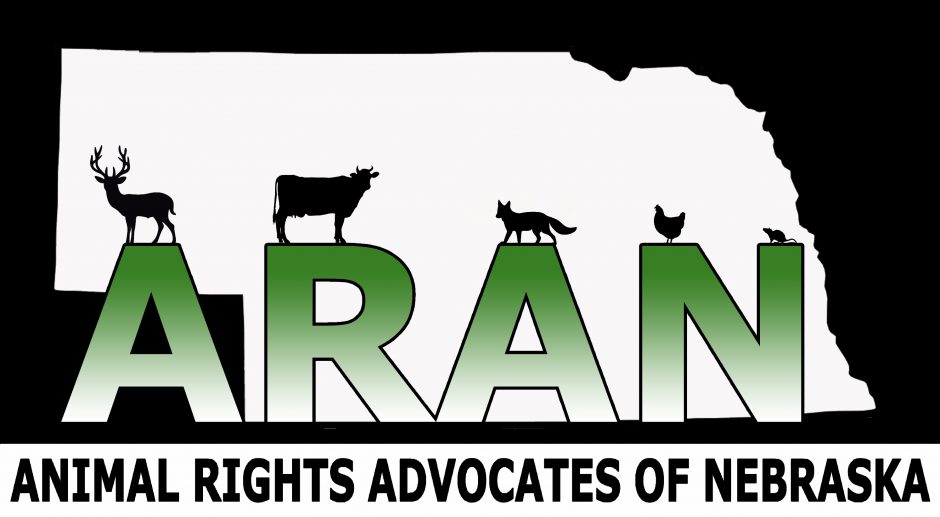***ATTENTION! OUR SITE WILL BE MOVING TO: https://aranebraska.blogspot.com/
Hello and welcome to our page! We are proud to say that our group has been educating and advocating for animal rights since 2009!
If you are interested in animal rights philosophy or in making a transition to veganism you may find the information on this site helpful. Please use the tabs at the top to explore! You may also contact us for more information or if you have any questions. Thanks for stopping by!
Mission Statement:
ARAN is dedicated to advancing the cause of animal rights. We believe non-human sentient animals deserve legal protections that would defend their most basic interests. We seek to promote animal rights through advocacy, education, activism, and by encouraging a vegan lifestyle. We support a variety of tactics in the struggle for the liberation of all human and non-human animals.
___________________________________________________________________
FAQ:
If you have a question for ARAN please send it to: contact (at) aranebraska (dot) org
What is meant by the term “animal rights”? / Does this mean animals would have the same rights as people?
The terms “animal rights” or “animal liberation” represent the view that non-human animals should have certain rights much like humans do in many modern societies. This does not mean that animals would have all of the same rights as people, however. For instance, certain rights—like the right to vote—are not applicable to non-human animals, for obvious reasons. Animal rights advocates propose that sentient animals should have legal protections to defend their most basic interests.
What is veganism?
Veganism is a lifestyle choice which intends to minimize the harm we cause to animals. Most people who decide to become vegan start with implementing a vegan diet — that is, a plant-based diet which attempts to exclude all products derived from animals (e.g., meat, dairy, eggs, etc.), or any products which are associated with cruel or exploitative practices. Often this is done in steps—for example, some start with giving up certain types of meat, then all meat, then dairy, then eggs, and so on; some decide to eliminate all animal products all at once, but this may be more challenging.
It should be noted that there is some debate within the animal rights community about which products are acceptable to consume. Some vegans do not consider honey or eggs, for example, to be ethically problematic if they are sourced from producers that are engaging in ethical practices.
People who adopt a vegan diet usually go on to adopt a holistic vegan lifestyle by not purchasing anything that contains animal products (e.g., leather, fur, wool, feathers, etc.), and by refusing to fund any enterprise which otherwise harms animals (e.g. animal research; animal labor; entertainment that harms animals—such as circuses, rodeos, animal blood sports, etc.) Most people find that adopting a compassionate lifestyle brings great meaning to their life. When one is living a vegan lifestyle they can rest assured that they are doing something, however small, to help animals.
What is sentience?
Sentience is the ability to feel or perceive — most importantly the ability to experience pain and pleasure. The movement for animal rights is concerned with securing rights for sentient animals. Only animals are sentient, however, not all animals are sentient (for example, sea sponges do not have a central nervous system and are not considered sentient). The scientific consensus holds that bacteria, viruses, plants, and fungi are incapable of sentience.
Animals in the wild kill and eat other animals—why shouldn’t we do the same?
The above statement is an example of what is called the appeal to nature fallacy. If one were to follow this line of logic one could justify many actions that most would consider to be unethical. We shouldn’t look to nature as a guide for what is ethical, but rather toward our ability to reason and feel compassion for other creatures who suffer like we do. Most would agree that it is wrong to cause suffering when it is avoidable or unnecessary—this is the basis of the movement for animal rights.
What about plants, don’t they feel pain too?
Plants lack brains or centralized, pain-sensing nervous systems of any kind, so they are unable to perceive or feel anything—although they do react biochemically in complex and fascinating ways to stimuli. In addition, from an evolutionary perspective plant sentience does not seem to confer any adaptive benefit—since plants are unable to move away from an aversive (harmful or painful) stimulus.
Even if it were the case that plants could feel pain or think, veganism would still make the most sense—in both practical and ethical terms. The animal agriculture industry uses most of the world’s plant crops as animal feed, and less food energy is returned to consumers in the animals’ carcasses than went into nourishing them. So, even in this scenario, it would seem that the best way to protect all life would be to only consume plants and fungi.
Animals are not as intelligent as people, so they probably do not feel pain like we do. Shouldn’t we therefore have a right to use them for food, research, etc.?
There is no clear evidence to indicate that sentience is proportionate to measured intelligence. If intelligence were the sole criteria for selecting which animals to eat or research on we would have to include very young humans or developmentally / cognitively disabled humans—as many animals we have traditionally consumed for food display levels of intelligence comparable with young or disabled humans. Most would agree that this is wrong.
What is the difference between animal welfare and animal rights?
Animal welfare is a position which does not challenge the idea that animals are ours to use however we see fit—whereas the animal rights position does. Animal rights advocates posit that animals have deserve certain protections that would preclude us from exploiting or killing them in most cases.
Why do you advocate for “human liberation” as well.
We are advocates for all animals, including humans—which are, after all, animals. For us, human suffering and animal suffering are inter-related and equivalent issues; we see both as social justice issues. Human liberation, just like animal liberation, means the liberation from systems which create or enable systematic violence, imprisonment, and oppression to occur.
How can I “go vegan”?
Check out our Go Vegan section. You can also contact ARAN at contact@aranebraska.org and we will send you out information on how to make the transition. You might also enjoy coming to one of our monthly vegan potlucks (see the “events” section) in order to get advice and ideas from other vegans.
How do I become an ARAN member?
We only ask that you agree with our mission statement. If you give us your contact information we will keep you updated on events and meetings, and information on how to get involved as a member.

